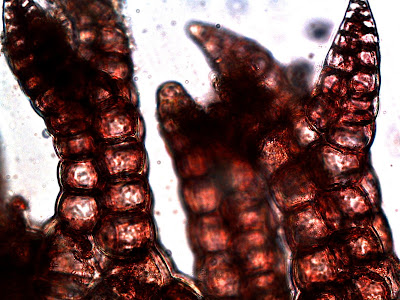 |
| Christine Sbick, Amed Scuba |
http://www.amedscubabali.com
98% der Biomasse des Meeres besteht aus Plankton. Plankton definiert sich durch Organismen, deren Schwimmrichtung von der Wasserströmung vorgegeben wird. Alles das, was von der Strömung des Wassers mitgetragen wird, gehört somit zum Plankton, also normalerweise aus winzig kleinen im Wasser dahin treibenden Pflanzen und Tieren. Aber auch größere Tiere wie zum Beispiel Quallen, die von der Strömung mitgetragen werden, gehören zum Plankton. Das Wort kommt aus dem griechischen und bedeutet, das Dahintreibende. Es dient primär und sekundär als Nahrung für das Nahrungsnetz aus Krebsen, Fischen, Säugetieren. Grob unterteilt man das Plankton als pflanzliches und als tiereisches Plankton. Das pflanzliche oder phytoplankton zeichnet sich dadurch aus, dass es mit Hilfe von Sonnenenergie, Wasser und Kohlenstoff Zucker und Sauerstoff aufbaut und damit zur
 |
| Amed Scuba: Phytoplankton |
 |
| Amed Scuba: Phytoplankton in Bali |
 |
| Amed Scuba: Plankton in Bali |
Nahrungspyramiden, Nahrungsketten und Nahrungsnetze im Ökosystem Meer. Dadurch stellt das Phytoplankton die Grundlage allen Lebens im Meer! Tierische Organismen fressen das
 |
| Amed Scuba Bali, Ein Plankton kommt selten allein! |
 |
| Plankton in Bali. Roter Farbstoff sind häufig Anthozyane, brauner Farbstoff Fucoxantin, Amed Scuba |
 |
| Amed Scuba, Plankton in Bali, Jemeluk |
In der Tiefsee lagern sich die Ausscheidungen der Tiere und ihre Kadaver in der Tiefe ab und auch jede Menge Mikroplastik befindet sich jetzt am Meeresgrund. Meeresströmungen, die die Weltmeere miteinander verbinden, wirken wie riesige Umwälzpumpen. In diesem Kreislauf sinkt kaltes, salzhaltiges und dadurch schwereres Wasser in die Tiefe auf den Meeresboden, wo es Nährstoffe aufnimmt und wenn es sich erwärmt und salzärmer wird, steigt das leichtere
 |
| Amed Scuba, Plankton Bali Jemeluk |
Bei guten Bedingungen teilt sich das Phytoplankton ein bis zwei Mal am Tag, so dass bei optimalen Bedingungen Algenblüten entstehen.
http://www.amedscubabali.com
https://www.faz.net/aktuell/gesellschaft/ozeane-erheblicher-planktonrueckgang-in-noerdlichen-ozeanen-170996.html
A large research synthesis, published in one of the world’s most influential scientific journals, has detected a decline in the amount of dissolved oxygen in oceans around the world — a long-predicted result of climate change that could have severe consequences for marine organisms if it continues.
The paper, published Wednesday in the journal Nature by oceanographer Sunke Schmidtko and two colleagues from the GEOMAR Helmholtz Centre for Ocean Research in Kiel, Germany, found a decline of more than 2 percent in ocean oxygen content worldwide between 1960 and 2010. The loss, however, showed up in some ocean basins more than others. The largest overall volume of oxygen was lost in the largest ocean — the Pacific — but as a percentage, the decline was sharpest in the Arctic Ocean, a region facing Earth’s most stark climate change.
 |
| Christine Sbick, http://www.amedscubabali.com |
Ocean oxygen is vital to marine organisms, but also very delicate — unlike in the atmosphere, where gases mix together thoroughly, in the ocean that is far harder to accomplish, Schmidtko explained. Moreover, he added, just 1 percent of all the Earth’s available oxygen mixes into the ocean; the vast majority remains in the air.
Climate change models predict the oceans will lose oxygen because of several factors. Most obvious is simply that warmer water holds less dissolved gases, including oxygen. “It’s the same reason we keep our sparkling drinks pretty cold,” Schmidtko said.
But another factor is the growing stratification of ocean waters. Oxygen enters the ocean at its surface, from the atmosphere and from the photosynthetic activity of marine microorganisms. But as that upper layer warms up, the oxygen-rich waters are less likely to mix down into cooler layers of the ocean because the warm waters are less dense and do not sink as readily.-https://www.washingtonpost.com/news/energy-environment/wp/2017/02/15/its-official-the-oceans-are-losing-oxygen-posing-growing-threats-to-marine-life/?postshare=7971487308694701&tid=ss_fb&utm_term=.a44548237a03growing-threats-to-marine-life/?postshare=7971487308694701&tid=ss_fb&utm_term=.a44548237a03
Keine Kommentare:
Kommentar veröffentlichen